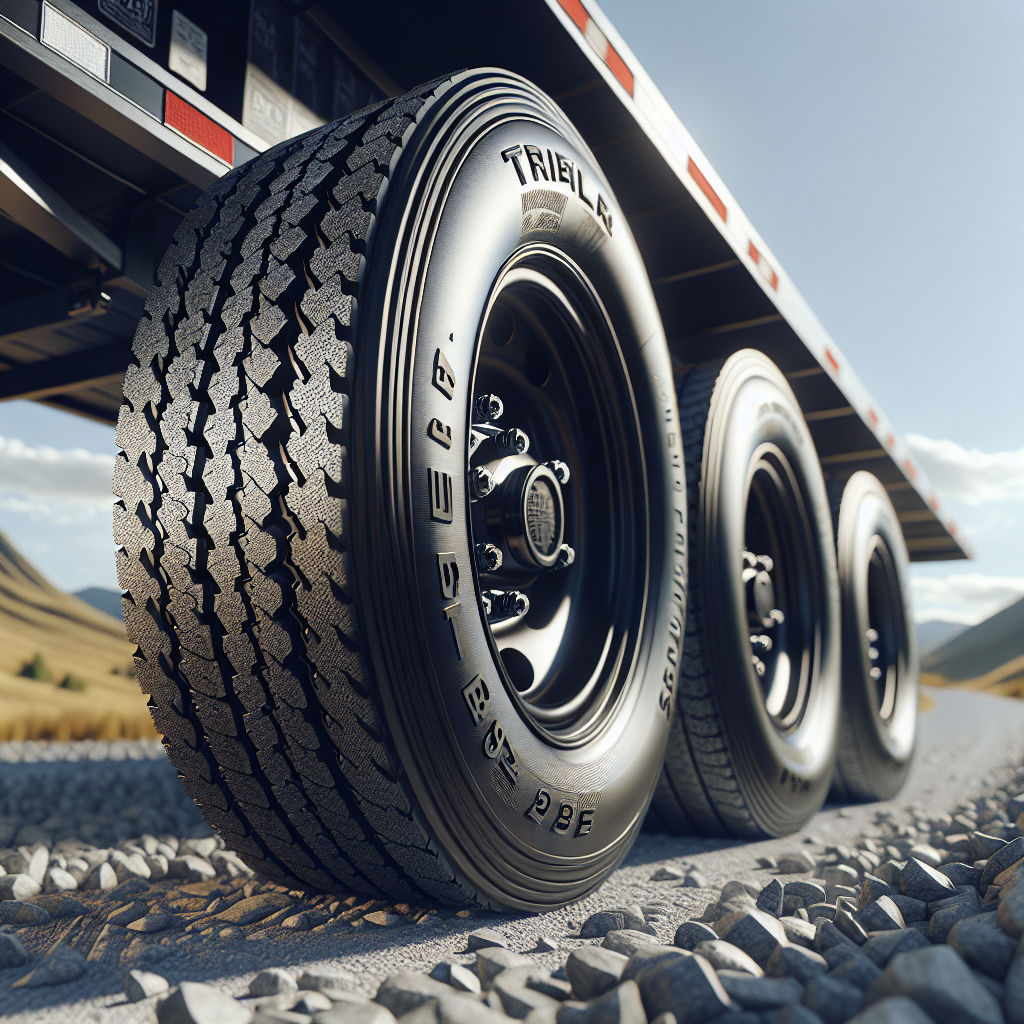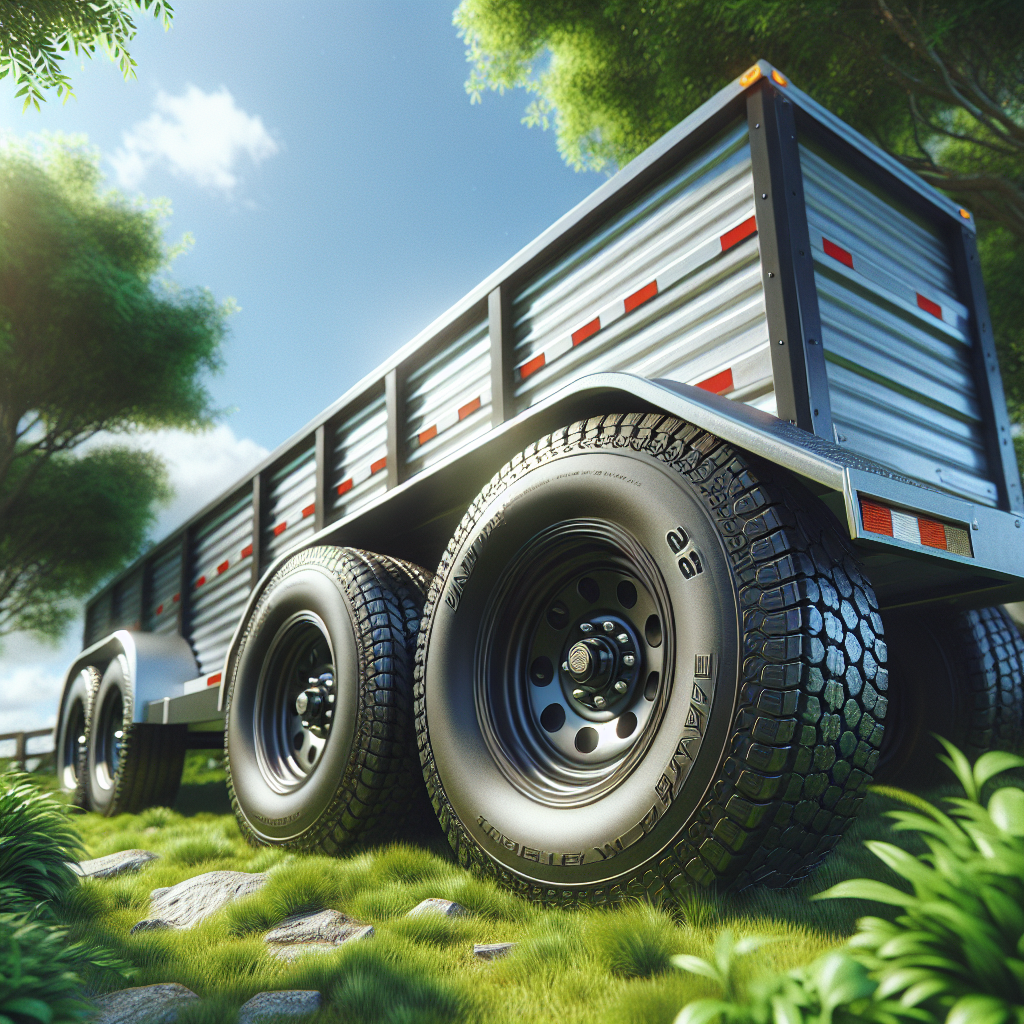Maintaining the correct PSI (pounds per square inch) in your trailer tires is crucial for ensuring both safety and optimal performance on the road. Many trailer owners often overlook this aspect, but understanding the impact of tire pressure can significantly reduce the risk of tire blowouts and enhance overall stability while towing.
When your trailer tires are inflated to the recommended PSI, several benefits come into play:
- Enhanced Handling: Proper tire pressure allows for better responsiveness and steering control, making your trailer easier to maneuver.
- Improved Fuel Efficiency: Adequately inflated tires reduce rolling resistance, leading to better fuel economy during your trips.
- Longer Tire Life: Maintaining the right PSI can extend the lifespan of your tires, saving you money on replacements.
- Prevention of Blowouts: Under-inflated tires can heat up quickly and are more prone to failure, which can lead to dangerous situations on the highway.
It is essential to check your tire pressure regularly, especially before long trips. Factors such as temperature changes and load weight can affect tire inflation. For your safety and peace of mind, consider utilizing a trailer monitoring system that provides real-time data on tire pressure and temperature.
Tow with peace of mind, knowing that trailerwatchdog is standing guard.
Recommended PSI Levels for Different Trailer Types
Different types of trailers have unique requirements when it comes to tire pressure, and understanding the recommended PSI levels for your specific trailer can greatly impact safety and performance. Here’s a breakdown of the recommended PSI levels for various trailer types:
- Utility Trailers: Generally, utility trailers should be inflated to a PSI between 50 to 60, depending on the load they are carrying. This range helps ensure stability and allows for optimal handling, especially when transporting heavy equipment.
- Travel Trailers: For travel trailers, the recommended PSI typically falls between 65 to 80. This higher pressure is necessary to support the additional weight and maintain stability on the road.
- Boat Trailers: Boat trailers usually require a PSI of around 30 to 50. The lower pressure can provide better traction on ramps and during loading and unloading.
- Fifth Wheel Trailers: These trailers often need a PSI of 80 to 110. Given their weight and the unique way they distribute weight over the towing vehicle, maintaining proper tire pressure is crucial for safety.
It’s important to consult your trailer’s owner manual or the sidewall of the tire for the manufacturer’s specific recommendations. Remember that tire pressure can fluctuate with temperature changes, so regular monitoring is essential, particularly before embarking on long journeys.
Consequences of Underinflated or Overinflated Tires

Maintaining the correct tire pressure is not just a matter of comfort; it significantly impacts safety, performance, and the lifespan of your trailer tires. Both underinflated and overinflated tires can lead to serious consequences:
- Underinflated Tires: When tires are underinflated, they experience increased rolling resistance, leading to greater fuel consumption and decreased efficiency. Additionally, the tire’s sidewalls flex more than they should, which can cause overheating and ultimately lead to blowouts. Underinflation also results in uneven tire wear, reducing the lifespan of the tire and potentially compromising safety.
- Overinflated Tires: Conversely, overinflated tires can also pose risks. They result in a harsher ride, as the tire becomes less able to absorb bumps in the road. This can lead to decreased traction, especially in wet conditions, making it more challenging to control the trailer. Overinflation can also cause excessive wear in the center of the tire tread, leading to premature tire failure.
- Increased Risk of Accidents: Both underinflated and overinflated tires can significantly increase the risk of accidents. A tire failure at high speeds can lead to loss of control, endangering both the occupants of the trailer and other road users.
Regularly checking and maintaining the proper tire pressure is crucial for ensuring a safer towing experience and prolonging the life of your tires. Always refer to the manufacturer’s specifications for the ideal PSI level to keep your trailer performing optimally.
How to Check and Maintain Your Trailer Tire PSI

Keeping your trailer tires at the correct PSI is essential for safety and performance. Here’s a straightforward guide on how to check and maintain your trailer tire PSI:
- Gather Necessary Tools: You'll need a reliable tire pressure gauge, which can be digital or analog, and an air compressor to inflate the tires if necessary. Optional items include a tire pressure monitoring system for ongoing monitoring.
- Check the Manufacturer’s Recommended PSI: Before checking your tire inflation, locate the recommended PSI for your trailer tires, usually found on a sticker inside the trailer's door frame or in the owner’s manual. This value may differ between the front and rear tires, so be sure to account for that.
- Measure Tire Pressure: Start by removing the valve cap from the tire you wish to check. Press the tire pressure gauge firmly onto the valve stem and note the reading. It’s best to check the tires when they are cold, as heat from driving can increase pressure readings.
- Adjust Pressure as Needed: If the reading is below the recommended PSI, use the air compressor to inflate the tire to the correct level. If it’s overinflated, you can release some air by pressing on the valve stem until you reach the desired PSI.
- Regular Maintenance: Make it a habit to check your tire pressure at least once a month and before long trips. Additionally, inspect the tires for any signs of wear, damage, or foreign objects that may affect performance.
By following these steps, you can ensure that your trailer tires remain in optimal condition, enhancing safety and efficiency while on the road.
Seasonal Changes and Their Impact on Tire Pressure

The impact of seasonal changes on tire pressure is a critical aspect every trailer owner should consider. Tire pressure is affected by temperature fluctuations, which can lead to either under-inflation or over-inflation if not monitored properly. Here's how different seasons can influence your trailer's tire pressure:
- Winter: Cold weather can cause tire pressure to drop significantly. For every 10°F decrease in temperature, tire pressure can decrease by approximately 1 PSI. This means that during winter months, it's essential to check your tire pressure frequently to avoid under-inflation, which can lead to poor handling and increased tire wear.
- Spring: As temperatures begin to rise, tire pressure will naturally increase. It's crucial to monitor your trailer tires during this transition to ensure they do not exceed the manufacturer’s recommended PSI. Over-inflated tires can lead to reduced traction and increased risk of blowouts.
- Summer: Hot weather can cause tire pressure to rise even more. Regularly check your PSI, especially before embarking on long trips, as high temperatures can further inflate your tires beyond safe limits. Additionally, the heat can exacerbate existing tire wear and damage.
- Fall: As the temperatures start to drop again, you may notice a decrease in tire pressure. This is a good time to check your tires and adjust the pressure accordingly to prepare for the winter months ahead.
Understanding how seasonal changes affect your trailer tires can help you maintain optimal PSI levels, ensuring better safety and performance throughout the year.
Utilizing Monitoring Systems for Optimal Tire Performance

In today’s technology-driven world, utilizing a trailer monitoring system is an effective way to ensure optimal tire performance. These advanced systems provide real-time data on tire pressure and temperature, allowing trailer owners to stay ahead of potential issues. Here’s how monitoring systems can enhance your trailer's safety and efficiency:
- Real-Time Monitoring: By continuously monitoring tire pressure and temperature, these systems alert you to any changes that may indicate a problem. This proactive approach helps prevent issues such as blowouts and tire degradation.
- Data Analysis: Many monitoring systems come equipped with analytics features that track tire performance over time. By understanding how your tires behave under different conditions, you can make informed decisions about maintenance and adjustments.
- Alerts and Notifications: With customizable alerts sent directly to your smartphone or onboard system, you will be immediately notified if tire pressure drops below or rises above the recommended levels. This allows for timely action, ensuring safety on the road.
- Enhanced Fuel Efficiency: Properly inflated tires contribute to better fuel efficiency. Monitoring systems help you maintain optimal tire PSI, which can lead to cost savings on fuel and improved overall performance.
Investing in a tire monitoring system is a smart choice for any trailer owner. It not only enhances safety but also provides peace of mind while towing. Tow with peace of mind, knowing that trailerwatchdog is standing guard.








